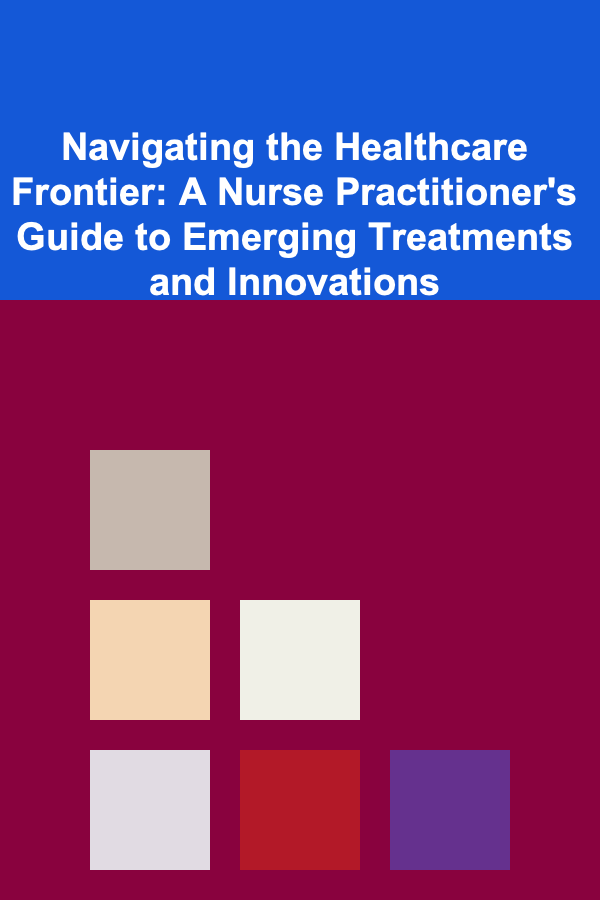
Navigating the Healthcare Frontier: A Nurse Practitioner's Guide to Emerging Treatments and Innovations
ebook include PDF & Audio bundle (Micro Guide)
$12.99$11.99
Limited Time Offer! Order within the next:

In an era where medical advancements and healthcare innovations are accelerating at an unprecedented pace, nurse practitioners (NPs) find themselves at the forefront of transforming patient care. With the continuous emergence of new treatments, technologies, and practices, it is crucial for NPs to stay informed and adapt to these changes in order to provide optimal care. This actionable guide delves into the key trends shaping the future of healthcare, providing NPs with the tools to navigate emerging treatments and innovations effectively.
Understanding the Landscape of Healthcare Innovations
The Role of Nurse Practitioners in Healthcare Innovation
Nurse practitioners have long been integral to patient care, serving as both primary care providers and specialized clinicians. As healthcare delivery evolves, NPs play an essential role in integrating new treatments and innovations into practice. NPs are uniquely positioned to be early adopters of emerging therapies due to their patient-centered approach, strong clinical knowledge, and ability to educate and advocate for patients. Their adaptability and hands-on experience make them invaluable in ensuring that new innovations translate into real-world improvements in patient outcomes.
As part of this evolving role, NPs must stay abreast of developments across various sectors of healthcare, from pharmacological treatments to digital health technologies. By understanding and utilizing these innovations, NPs can offer enhanced care, make informed decisions, and contribute to shaping the future of healthcare delivery.
Key Areas of Emerging Healthcare Innovations
1. Personalized Medicine: Tailoring Treatment to the Individual
Personalized medicine, also known as precision medicine, is one of the most exciting areas of healthcare innovation. It involves customizing healthcare treatments based on individual genetic profiles, lifestyle, and environmental factors. This approach allows for more precise and effective treatments that cater specifically to the unique characteristics of each patient.
What NPs Need to Know
- Genomic Medicine: Advances in genomic research have led to a deeper understanding of how genetic variations influence disease development and response to treatment. With the ability to sequence a patient's genome quickly and affordably, NPs can help guide treatment decisions that are more precise and personalized.
- Pharmacogenomics: Understanding how genetics influence drug metabolism is key to avoiding adverse drug reactions and ensuring the efficacy of prescribed treatments. Pharmacogenomic testing can guide the selection of medications and dosages, optimizing patient care.
- Actionable Steps for NPs: NPs can educate patients about the benefits of personalized medicine, incorporate genetic testing into patient care when appropriate, and work with specialists to interpret results and adjust treatment plans accordingly.
2. Telehealth and Virtual Care: Expanding Access to Healthcare
Telehealth and virtual care have been particularly transformative, especially in light of the COVID-19 pandemic. These technologies enable patients to receive care remotely, expanding access for individuals in rural areas, those with limited mobility, or those seeking more convenient healthcare options.
What NPs Need to Know
- Telemedicine Platforms: With the proliferation of telemedicine platforms, NPs can now provide consultations, follow-up care, and chronic disease management remotely. These platforms include video calls, secure messaging, and remote monitoring devices.
- Benefits and Challenges: Telehealth reduces barriers to care, increases patient convenience, and enables better chronic disease management. However, NPs must navigate challenges related to technology access, privacy concerns, and the need for appropriate reimbursement policies.
- Actionable Steps for NPs: NPs can integrate telehealth into their practice by offering virtual consultations, establishing clear guidelines for remote care, and familiarizing themselves with the legal and ethical aspects of telemedicine. Additionally, NPs should ensure that patients have access to the necessary technology and support to engage in telehealth sessions.
3. Artificial Intelligence (AI) and Machine Learning: Enhancing Diagnostics and Treatment
Artificial intelligence (AI) and machine learning are transforming the way healthcare providers diagnose, treat, and manage patients. These technologies utilize vast amounts of data to identify patterns, predict outcomes, and make clinical decisions with greater precision.
What NPs Need to Know
- AI in Diagnostics: AI-powered diagnostic tools can assist in interpreting medical imaging, laboratory results, and patient data to identify potential conditions more accurately and quickly than traditional methods.
- Predictive Analytics: Machine learning algorithms can analyze patient data to predict disease progression and identify at-risk patients. This can lead to earlier interventions and more proactive care.
- Actionable Steps for NPs: NPs should familiarize themselves with AI-powered tools relevant to their field, such as AI systems that assist in diagnosing dermatological conditions or those used for analyzing radiological images. Integrating these tools into clinical practice can enhance diagnostic accuracy and improve patient outcomes.
4. Regenerative Medicine: The Future of Healing and Recovery
Regenerative medicine is a rapidly growing field focused on repairing or replacing damaged tissues and organs through stem cell therapy, tissue engineering, and gene editing. These cutting-edge treatments hold the potential to revolutionize the way healthcare providers approach chronic conditions, injuries, and even genetic disorders.
What NPs Need to Know
- Stem Cell Therapy: Stem cell treatments are being researched for various applications, such as repairing heart tissue after a heart attack, regenerating cartilage in joints, or aiding in wound healing.
- Gene Editing: Technologies like CRISPR-Cas9 have opened the door to precise genetic alterations, offering the possibility of curing genetic disorders at their root cause.
- Actionable Steps for NPs: NPs can stay informed about the latest developments in regenerative medicine, educate patients on emerging therapies, and collaborate with specialists to determine when these treatments may be appropriate for certain conditions.
5. Advanced Robotics and Minimally Invasive Surgery: Improving Surgical Precision
Advancements in robotics and minimally invasive surgery have drastically improved surgical outcomes by minimizing risks, reducing recovery times, and increasing precision. These technologies use robotic arms controlled by surgeons to perform highly delicate procedures with increased accuracy.
What NPs Need to Know
- Robotic-Assisted Surgery: Robotic systems, such as the da Vinci Surgical System, offer enhanced precision and control, allowing for more complex surgeries to be performed with smaller incisions and less tissue damage.
- Minimally Invasive Techniques: These procedures typically result in faster recovery times, less post-operative pain, and reduced hospital stays. NPs must understand these procedures to provide proper pre- and post-operative care.
- Actionable Steps for NPs: NPs should stay current with the types of robotic surgeries available and their benefits. They can also educate patients on what to expect before and after these procedures and manage post-operative recovery effectively.
6. Immunotherapy and Targeted Cancer Treatments: A New Frontier in Oncology
Immunotherapy and targeted therapies have emerged as groundbreaking treatments in the fight against cancer. These therapies work by boosting the body's immune system or targeting specific cancer cells to destroy them without harming healthy tissue.
What NPs Need to Know
- Immunotherapy: This approach stimulates the immune system to recognize and attack cancer cells. It has been particularly successful in treating cancers like melanoma, lung cancer, and lymphoma.
- Targeted Therapy: Unlike traditional chemotherapy, which affects both healthy and cancerous cells, targeted therapies focus on specific molecular markers that are present in cancer cells, leading to more precise treatments with fewer side effects.
- Actionable Steps for NPs: NPs working in oncology must stay informed about the latest immunotherapies and targeted treatments. They can educate patients about these therapies, monitor for side effects, and assist in navigating the emotional and psychological aspects of cancer treatment.
Embracing Innovation: A Path Forward for Nurse Practitioners
As the healthcare landscape continues to evolve, nurse practitioners must remain agile and proactive in embracing new treatments and innovations. By continuously updating their knowledge and integrating cutting-edge technologies into practice, NPs can improve patient care, enhance clinical outcomes, and contribute to shaping the future of healthcare.
In addition to staying informed, NPs can also play a role in advocating for patients' access to emerging treatments, especially as healthcare systems work to incorporate new technologies and therapies. By becoming champions of innovation and leading the charge in adapting to these changes, nurse practitioners can truly navigate the healthcare frontier and continue to provide exceptional care in an ever-changing world.
By actively engaging with emerging treatments and staying at the forefront of technological advancements, nurse practitioners will be empowered to make an even greater impact on patient care, improving lives and shaping the future of healthcare for generations to come.

How to Build a Checklist for Managing Inventory in Shipping
Read More
How to Incorporate Vintage Holiday Decorations into Your Home
Read More
How to Make a Checklist for Renovating Your Basement
Read More
How to Plan Ahead for Saving on Holiday and Seasonal Expenses
Read More
How to Prepare for Common Workshop Challenges and Solve Them
Read More
How to Turn Your Deep Learning Projects into Money-Making Opportunities
Read MoreOther Products

How to Build a Checklist for Managing Inventory in Shipping
Read More
How to Incorporate Vintage Holiday Decorations into Your Home
Read More
How to Make a Checklist for Renovating Your Basement
Read More
How to Plan Ahead for Saving on Holiday and Seasonal Expenses
Read More
How to Prepare for Common Workshop Challenges and Solve Them
Read More